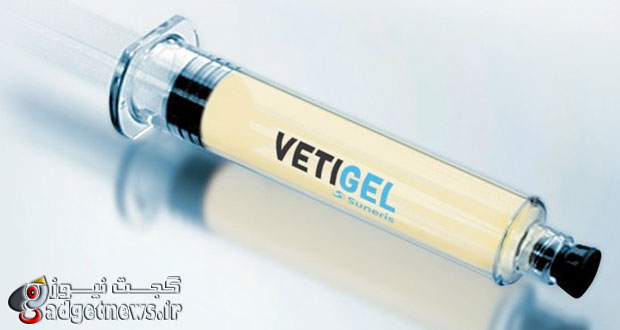هنگامی که خونریزی از یک زخم عمیق آغاز میشود، توقف هر چه سریعتر آن مهمترین اولویت است. “سانریس” یک استارتاپ آمریکایی فعال در حوزه بیوتکنولوژی دست به تولید ژلی معجزهگر زده که میتواند به شکل بسیار سریعی خونریزی را در هر نقطه از بدن متوقف کند.این ژل با نام VetiGel هم اکنون به مرحله تولید رسیده و در قدم نخست راهی کلینک های دامپزشکی شده است.
شاید در نگاه نخست وتیژل را مانند یک بانداژ و نوار زخم لیکوئیدی تصور کنید، اما ژل جدید پا را فراتر گذاشته و علاوه بر زخمهای معمولی روی پوست، از خونریزی اعضای درونی بدن نیز جلوگیری میکند.
وتیژل میتواند در اتاق عمل برای جلوگیری از زخمهای عمیق و یا در عملیاتهای پلیسی و در میادین جنگی کاربردهای گسترده ای داشته باشد.
مؤسس این استارتاپ، جو لاندولینا این ژل گیاهی را به گونه ای تولید کرده که قادر است در کمتر از 20 ثانیه زخم های عمیق را مسدود کند. ایده ساخت این ژل نخستین بار سال 2011 و در زمان تحصیل به ذهن لاندولینا رسید و پس از ساخت ورژن اولیه آن توانست جایزه برتر دانشگاه در حوزه اختراعات را به دست بیاورد.
در مصاحبه ای که وی با بلومبرگ داشته، ساختار و نوع عملکرد وتیژل را بر اساس بلاک یا قطعات Lego ها میداند. این قطعات پلیمری گیاهی در صورت قرارگیری بر روی هر جسمی میتوانند بنا بر ساختمان آن کنار یکدیگر قرار گرفته و جراحت بازشده را ببندند. همین ساختار ویژه عاملی برای بستهشدن سریع جراحات سنگین است.
عمر احمد نائب رییس بخش مهندسی این استارتاپ نیز میگوید که بهترین محصولات کنونی بین 5 تا 10 دقیقه خون ریزی را متوقف میکنند، در حالی که وتیژل در کمتر از یک دقیقه این عمل را انجام میدهد.
ژل تازه اختراع شده هنوز برای انسانها آماده نیست و تا دریافت تأییده FDA آمریکا فاصله دارد، اما میتوان از هم اکنون آینده بسیار درخشان این محصول را در بازار تصور کرد. سانریس مذاکراتی را با مسئولین نظامی ایالات متحده برای استفاده از این ژلها نیز آغاز کرده است.
منبع : CNET
Plant-based gel can stop traumatic bleeding in seconds
Plant-based gel can stop traumatic bleeding in seconds
Biotech startup Suneris has developed a plant-based polymer it says functions like “Lego building blocks for the body,” drastically reducing the amount of time it takes to stop a wound from bleeding.
When bleeding from a traumatic injury begins, time is of the essence. VetiGel, a new plant-based gel that can be applied either to skin or soft organs, halts bleeding rapidly and could thus save lives on the battlefield and elsewhere. For now, it’s starting to roll out to veterinary clinics.
Joe Landolina is the CEO and co-founder of Brooklyn biotech startup Suneris. He created the plant-based polymer gel, which can be placed on open wounds to stop bleeding in just 20 seconds.
On the surface, VetiGel seems like some other liquid-bandage products on the market, but it goes beyond superficial injuries to work on both skin and organs. Imagine a surgeon being able to quickly close an organ she is operating on to minimize blood loss, or a police officer being able to stop the bleeding from a bullet wound in the field.
Landolina got the idea for VetiGel in 2011, while a freshmen at NYU. He created the first version of VetiGel with fellow NYU student Kenny Mai, and their project won top honors in the NYU Time Warner Cable Inno/Vention Competition in 2011. Landolina told the Huffington Post in 2013 that Mai left the company to focus on his studies.
In an interview with Bloomberg, which you can watch at the top of this post, Landolina describes VetiGel as being like Lego building blocks for the body. The building blocks in this case are plant-based polymers pulled from the cell walls of a plant that basically reassemble onto whatever you put them next to (skin, for example), which helps clot blood in seconds.
Seconds can sometimes mean the difference between life and death. In the Bloomberg interview, Omar Ahmad, Suneris vice president of engineering, gave a theoretical example of a soldier on a battlefield who was shot, severing his femoral artery. Existing products can stop the bleeding in 5 to 10 minutes. But VetiGel is supposed to be capable of stopping the bleeding in under a minute, giving that soldier a better chance of living.
VetiGel isn’t ready for humans, yet, and needs more testing and refining before it becomes an FDA-approved, market-ready product. But it’s getting closer to that point, and will soon be commercially available as a product veterinarians can use to help stop bleeding during animal surgeries. VetiGel has undergone animal testing under the supervision of a cardiovascular surgeon, and was determined to be safe enough for use in animals.
Vets and vet clinics interested in testing out VetiGel can sign up on the Suneris site.
If the product gets approved for humans, the primary initial market will likely be the armed services, and Suneris is already in talks with military officials who are interested in such a product.
 گجت نیوز آخرین اخبار تکنولوژی، علم و خودرو
گجت نیوز آخرین اخبار تکنولوژی، علم و خودرو 





